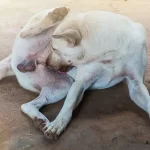Why Does My Dog Bite My Hair
Why Does My Dog Bite My Hair? Exploring the Possible Reasons and Solutions
If you have ever felt your dog nibbling on your locks or tugging on your ponytail, you may have wondered why they do it. Is it a sign of affection, playfulness, dominance, anxiety, or something else? Can it be harmful to your hair or your relationship with your furry friend? In this article, we will delve into the curious behavior of dogs biting hair and provide some insights and tips for dog owners who want to understand and manage it.
Introduction: The Hair-Biting Habit
Dogs are known for their various habits and quirks that can both amuse and frustrate their human companions. From barking at squirrels to digging holes to chasing tails, dogs seem to have endless energy and curiosity that make them fascinating creatures. However, some of their behaviors can also be puzzling or problematic, especially when they involve humans or other animals. One such behavior is hair-biting, which can range from gentle mouthing to vigorous pulling that may hurt or damage the hair or scalp.
Before we explore the reasons behind this behavior and how to address it, let’s clarify some terms and concepts related to dog behavior and communication. Dogs use their bodies, voices, and scents to express themselves and interact with others. They also respond to environmental stimuli such as sounds, smells, sights, tastes, and textures. When a dog bites or nips at something or someone, they may convey different messages depending on their intention and context. Some common meanings of dog bites include:
– Playful bite: This is a mild form of mouthing that dogs often use during playtime or socialization with other dogs or humans. It usually involves no pressure or harm and can be a way for dogs to release excess energy or express excitement.
– Investigative bite: This is a curious form of exploration that dogs may use to sniff or taste objects or surfaces, including hair. It can be a natural way for dogs to gather information about their environment and learn about new things.
– Aggressive bite: This is a serious form of attack that dogs may use to defend themselves, their territory, or their resources, or to assert dominance over other dogs or humans. It can cause injury or trauma and requires professional intervention to prevent or treat.
Now that we have some basic understanding of dog bites, let’s examine why dogs may bite hair and how to distinguish between the different types of bites.
Reasons Why Dogs Bite Hair
There are several possible reasons why a dog may bite hair, depending on their breed, age, gender, personality, training, health, and environment. Some common reasons include:
– Playful behavior: As mentioned earlier, dogs may see hair as a fun and interesting thing to chew on or tug at during playtime. This behavior can be harmless if it involves no pain or aggression and if the dog respects your boundaries and stops when you ask them to.
– Grooming instinct: Dogs are known for their grooming habits such as licking themselves or other animals. Some dogs may also try to groom their human companions by biting their hair or scalp. This behavior can indicate affection and trust but should be monitored for hygiene and safety reasons.
– Attention-seeking behavior: Dogs crave attention from their owners and may resort to biting hair as a way to get noticed or interacted with. This behavior can be reinforced if the owner responds positively (e.g., laughing, petting) to it but should be discouraged if it becomes excessive or annoying.
– Anxiety or stress: Dogs may exhibit compulsive behaviors such as biting hair when they are anxious or stressed due to separation anxiety, fear of loud noises, changes in routine or environment, or other triggers. This behavior can indicate underlying emotional issues that require professional help.
– Health problems: Dogs may bite hair if they have skin allergies, infections, parasites, or other health problems that cause itching or discomfort. This behavior can be a symptom of an underlying condition that needs to be diagnosed and treated by a veterinarian.
Now that we have some possible reasons why dogs bite hair, let’s discuss how to address each one and prevent or manage the behavior.
Solutions for Hair-Biting Behavior
The following tips are based on general principles of dog behavior modification and should be adapted to your specific situation and dog’s needs. If you are unsure about how to deal with your dog’s hair-biting behavior, consult a certified dog trainer or behaviorist who can provide personalized advice and support.
– Playful behavior: If your dog bites your hair during playtime, make sure you use appropriate toys and games that redirect their attention away from your hair. You can also teach them commands such as “leave it” or “drop it” that discourage biting and reward them when they obey. Avoid roughhousing or wrestling with your dog as this can encourage biting and dominance behaviors.
– Grooming instinct: If your dog bites your hair as a way of grooming you, you can offer them alternative ways to express their affection such as petting, cuddling, or licking your hands or face (if you don’t mind). You can also train them to stop biting when you say “no” or “stop” and reward them with treats when they comply. Avoid letting your dog lick your scalp or face if you have sensitive skin or allergies.
– Attention-seeking behavior: If your dog bites your hair as a way of getting attention, make sure you give them enough exercise, mental stimulation, and positive reinforcement for good behavior. You can also ignore them when they bite and only reward them when they behave calmly or sit quietly near you. Avoid scolding or hitting your dog as this can worsen their anxiety or aggression.
– Anxiety or stress: If your dog bites your hair as a way of coping with anxiety or stress, you may need to identify and address the underlying triggers and provide them with a safe and comfortable environment. You can use calming aids such as pheromone sprays, music therapy, or herbal supplements (under veterinary supervision) to reduce their anxiety. You can also train them to perform relaxation exercises such as deep breathing or stretching that help them calm down. Avoid exposing your dog to excessive noise, crowds, or unfamiliar situations if they are prone to anxiety.
– Health problems: If your dog bites your hair due to skin irritation or other health issues, you should seek veterinary care immediately. Your vet may prescribe medications, shampoos, or other treatments that can alleviate the symptoms and prevent further damage.
Conclusion: The Hair-Biting Mystery Unraveled
In this article, we have explored the various reasons why dogs may bite hair and how to distinguish between playful, grooming, attention-seeking, anxiety-related, and health-related behaviors. We have also provided some solutions and tips for dog owners who want to manage this behavior and foster a positive relationship with their furry friend. Remember that every dog is unique and may have different needs and preferences when it comes to communication and interaction. By observing your dog’s body language, respecting their boundaries, and providing them with proper care and training, you can enhance their well-being and happiness as well as yours. And if all else fails, you can always wear a hat or tie up your hair!



